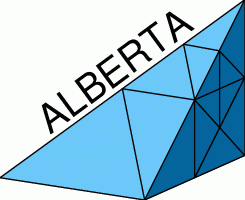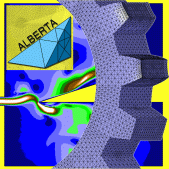RheoPlast Phase Field Multi-Physics Code
RheoPlast
Adam Powell, David Dussault, Bo Zhou, Jorge Vieyra, Wanida PongsaksawadLast modified August 31, 2004
As described in the RheoPlast introduction:
- There are lots of phase field codes out there, but the best and most open is this one. It's also the most modular, the most flexible, the highest-performance, well, what can we say, it's just the best! And its authors are the most modest...
As papers are submitted for publication, RheoPlast will expand to simulate transport-limited electrochemistry and anisotropic solidification, also with fluid flow and fluid-structure interactions. Version 1.0 with these capabilities will be released around the end of 2004.
At that point, work on this version will cease, and RheoPlast will transition to unstructured-grid finite elements, likely based on PETSc 3. This will be the basis of versions 1.9 through at least 2.0.
Download
To run RheoPlast, you need to install PETSc and Illuminator. If you run Debian, just type:- apt-get install illuminator-dev
- tar xzf rheoplast-0.5.0.tar.gz
cd rheoplast-0.5.0
./configure
make
| .tar.gz package | Signature | Documentation | Requirements |
| rheoplast-0.5.0.tar.gz | rheoplast-0.5.0.tar.gz.asc | rheoplast-doc-0.5.0/ | Illuminator 0.8.9, PETSc 2.2.0 |


